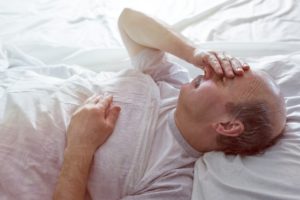 Sleep disturbances are more common than you might think. They are estimated to affect between 36 and 69% of older adults. Past research has linked sleep disturbances to depression, increased risk of mortality, type 2 diabetes, cardiovascular disease, cancer, cognitive decline, decrease in physical function, and lowered quality of life. Because of the known vast effects that sleep disturbances can have on physical and mental health, a group of researchers began a study with the aim of determining if there is a relationship between sleep disturbances and an increased risk of falls among older women.
Sleep disturbances are more common than you might think. They are estimated to affect between 36 and 69% of older adults. Past research has linked sleep disturbances to depression, increased risk of mortality, type 2 diabetes, cardiovascular disease, cancer, cognitive decline, decrease in physical function, and lowered quality of life. Because of the known vast effects that sleep disturbances can have on physical and mental health, a group of researchers began a study with the aim of determining if there is a relationship between sleep disturbances and an increased risk of falls among older women.
The basis of the study were previous findings that related sleep disturbances to bone metabolism, increasing a patient’s risk of fractures. For the current study, the researchers recruited 157,306 women, aged 50 to 79, as participants. The participants responded to questionnaires on sleep quality, sleep duration, and insomnia and annually self-reported their number of falls throughout the year, excluding falls due to intentional physical activity.
Advertisement
The majority of the women reported sleeping 7 hours per night, but 8.3% slept less than 5 hours on average and 4.4% slept more than 9 hours per night on average. Both the women who reported shorter sleep and those who reported longer sleep than average showed a higher rate of depressive symptoms. Among those who slept less than 5 hours per night, 10.6% reported recurring falls annually. This percentage increased to 11.8% in the participants who reported sleeping 9 or more hours per night. The risk of fractures was greatest in the participants who slept the shortest or longest and those with very restless sleep, the highest level of sleep disturbance, and insomnia.
Shorter Sleep Times Increase Risk of Fractures
After adjusting for confounding factors, the researchers calculated that the women who slept the shortest duration per night had a 27% increased risk of experiencing recurring falls throughout the year and those who slept the longest duration each night showed a 24% increase in this same risk, compared to the women who slept an average of 7 hours per night. The participants who reported restless sleep had between an 11 and 21% increased of recurring falls, compared to those who reported sound or restful sleep.
Those in the shortest duration of sleep group also had an increased risk of suffering a fracture, between 10% and 13% higher than those with a normal duration of sleep. These results were not found in those in the longest sleep duration group, however, which was confounding to the researchers behind the study, as generally an increased risk of a fall would also increase a patient’s risk of fracture, but this was not the case here. They feel that further research may be able to resolve this seeming inconsistency in their findings.
From these results, the researchers do believe that when assessing patient groups with a high risk for falls and recurring falls, sleep disturbances and quality of sleep should be taken into consideration as potential risk factors.
Also Read:
- Deep Breathing Exercises for Sleep Using Meditative, Diaphragmatic, and Various Other Breath Control Methods
- Yoga for Sleep: Simple Yoga Exercises for Restful Sleep
